To be able to eventually harvest or enjoy carefully planned, planted and nourished vegetation, novice and experienced gardeners alike understand the importance of repelling animals from their gardens. Keeping critters out of the garden requires the same dedication and adaptability as other planting considerations, such as crop planning or watering and fertilizing. While routine prevention and maintenance help protect your home from pests and wildlife, a similar approach can support the health and longevity of your garden and yard. With all things gardening, it takes time and patience, but the following offers more proactive steps to learn more about how to repel animals from your garden. The guide includes information about how to know if you have a problem, what to consider when planning your solutions, and how to deal with five of the most common and troublesome garden invaders.
What signs indicate that it’s time to repel animals from your garden?
While sometimes a garden crisis or a crop’s failure to thrive may fall on the gardener, many more times a less successful yield or growing year stems from inadequacies in repelling problematic animals and insects in a timely manner. The Center for Agriculture, Food, and the Environment at UMass Amherst, shares some of the most common signs of critters in the garden:
- Animals visible in planters, beds and surrounding fencing, as well as on nearby lawns or shrubs
- Evidence of digging in and around fencing, containers or beds
- Droppings or tracks
- Trampled or chewed plants
- Plants eaten to the ground or with new growth nibbled off
- Fruit or flowers are compromised or removed
While the signs of intruders may be clear, identifying the type of animal can be more difficult. Importantly, being able to identify the garden pest helps address the issue. For example, leaf damage can be caused by a number of different sources. Effectively determining the culprit depends on factors such as environmental clues (like tracks), time of day and magnitude and location of damage, as further explored in this guide from the Michigan State University Extension. Consequently, one of the best ways to defend your garden is by proactively minimizing who and what has access to it.
What should be considered when planning how to repel animals?
Determining the most effective ways to repel animals from your garden requires research. At the beginning of this process or in managing a new garden, figuring out how to choose from the many available options may seem overwhelming. To help you narrow your search and refine your approach to garden protection, consider the following recommendations:
Try multiple strategies.
Tiki torches and bug sprays are often used in combination with pest-repelling plants to keep mosquitoes from ruining a beautiful night on the patio or family picnic. Similarly, it’s best to implement several different methods in order to repel animals from your garden.
- Design gardens strategically, interspersing different types of vegetables, flowers and shrubs, to help deter problematic pests, like ants and grasshoppers.
- Employ more than one physical barrier, such as incorporating wire mesh covers in raised beds or covering planters with bird netting.
- Fix the hole in the fence now instead of later. Put the row cover on when you plant the new seedlings instead of after you see lost plants or damage. Combining proactive measures with preventative ones are key.
Think about necessary safety considerations.
Many people garden with their kids or grandkids or use their outdoor space to host outdoor movie nights, backyard campouts and more! Others know that they are likely to show their gardens to family, friends and neighbors or share the available bounty as it arrives. Consequently, any pest management efforts need to account for the people and pets who may be exposed to those measures. For example, some liquid treatments may require both puppies and people to stay out of the garden for a set period of time to avoid any accidental ingestion or contact. In some cases, natural animal repellent tactics may be preferable, especially if gardens include food for eventual consumption.
Monitor your gardens and take action accordingly.
Regularly monitoring your garden can make the difference between reversible and irreversible damage. If the birds are pecking at your pea plants, use reflective deterrents or install bird netting now to save your crop. Otherwise, there may be few if any seedlings to mature. However, be careful not to go to extremes. If one bird is hopping along your fencing, it doesn’t mean that your plants are being destroyed. Take note of any animal presence and associated impact on the plants, and then start small when it comes to repelling animals from the garden. After all, many animals who may cause minor problems may be simultaneously benefitting the garden, such as the birds who eat a few peas but also consume harmful slugs and beetles.
Be consistent with garden maintenance and upkeep.
Regular harvesting means less produce available for animal consumers. Keeping the garden gate closed means less access for inquisitive pests. Routine weeding and other garden maintenance reduces the potential for chipmunks and other rodents to make nests in overgrown sections.
Importantly, as emphasized by the Pennsylvania Horticultural Society, remember that your garden is unique: its general needs and its pest management necessities will vary by year (or even by season!). Each year that you successfully repel animals from your garden and those in which you don’t quite keep the slugs or other pests from damaging your crops will provide valuable information for future years.
How to repel 5 of the most troublesome animals from your garden
Last year, the squirrel left the remains of its stolen berries right on top of the garden rail. The year before, the neighborhood woodchuck decimated your lettuce crop. In some growing seasons, it can seem like you are putting in the labor but rarely enjoying the fruits (or vegetables) of it. To help you safeguard your hard-earned fruit, veggies and other plants, we’ve assembled these recommendations to help you repel the animals listed below and many others from your garden.
Rabbits
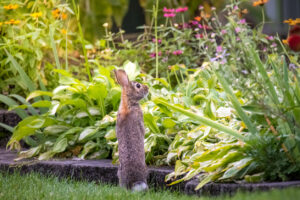
Cute baby rabbits at rest under a tree or even near the garden fence may create a picturesque scene. However, their proximity to your garden means that this year’s planting efforts may be in jeopardy. For example, the growing experts at Bonnie Plants note that lettuce and beans, as well as flowers like pansies and petunias, may be at risk. Fortunately, there are many strategies that can help you deter rabbits from your garden, including the two plant-based methods.
- Plant a garden just for them! Creating a specialty garden away from the main garden can increase curb appeal and deter rabbits from other main garden beds. According to home and garden resource, The Spruce, annuals like Bachelor’s buttons and cosmos and perennials such as clematis and coneflowers not only add vibrant color to your landscape but also attract hungry rabbits. Consider interspersing such flowers with vegetables like peas and lettuce to make that location an even more enticing buffet.
- Grow rabbit-resistant plants. If you prefer to keep as much of your garden’s glory for your own consumption, choose plants that actually repel animals like rabbits from the garden. Shrubs like Japanese maples and rhododendrons as well as flowers like peonies, sedum, and vinca help beautify your yard and while also helping keep rabbits away from gardens.
Deer
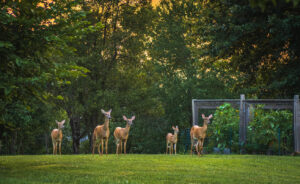
In just one visit, deer can trample an entire garden, eat any emerging seedlings and leave a pile of scat to further signify their presence. The best way to keep deer away from the garden is with extremely high fencing of at least 6 feet. However, the cost or aesthetic impact of this choice may not appeal to all property owners. Below, find options for revising or revisiting current garden practices to help repel deer and other animals from your raised beds and newly planted plots.
- Add an herb garden! As various shrubs, flowers, vegetables and fruit do in repelling rabbits and other animals from gardens, herbs are another powerful tool to leverage as a garden pest deterrent. If your herb garden typically flourishes on your kitchen windowsill, consider establishing an herb border around your garden or using hanging planters on garden fencing. Herbs like lavender, thyme and chives provide sensory appeal in your yard and serve similarly in culinary applications, while also helping to thwart pests like deer from garden destruction.
- Refrain from excessive fertilizing and watering. Too much fertilizer and water can result in soil imbalances or even damage and death to the plants that they are supposed to nourish. The Merrifield Garden Center also cautions that growth bolstered with abundant nitrogen and water may make the vegetation especially appealing to deer, particularly when conditions are dry.
Woodchucks
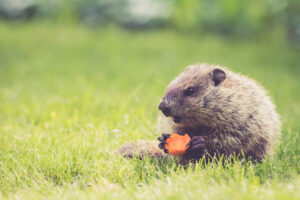
Whether you refer to them as woodchucks or groundhogs, these pests can do extensive damage to gardens, lawns and even outdoor equipment and building foundations. Even though they may hibernate for several months of the year, they make the most of the other months to dig holes, burrow where they shouldn’t be and run amok through your carefully nurtured garden. Many of the recommendations for repelling other problematic animals from the garden may also be used for deterring woodchucks. However, the best garden protection plan often utilizes a multi-layered approach, such as combining physical barriers and natural deterrents. Two of the natural ways to get rid of groundhogs in addition to other garden intruders are as follows:
- Use a covered compost container. Woodchucks, skunks, rats and even bears may be enticed by the goodies and/or environment of your compost bin. These tips from the University of Vermont Extension may aid in compost composition as well as pest prevention.
- Buy some cayenne pepper in bulk. This fan favorite tip from the Farmers’ Almanac works as a repellent for many garden pests. Sprinkle dried cayenne pepper around the gardens, make pepper-infused sprays for plants or try pouring it around holes and tunnels made by woodchucks. Remember to reapply regularly, especially after windy or rainy weather. If you already grow and enjoy these peppers fresh from the garden, you can also use fresh peppers in similar woodchuck repellent applications.
Squirrels
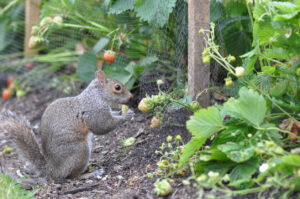
Watching squirrels frolic across tree limbs and fencing becomes much less entertaining when they are carrying off that first strawberry or fresh green bean. Keeping squirrels and other pests out of gardens often requires creative solutions, like these two options:
- Scatter soap. Fragrant bars of soap, old soap slivers and dish soap have significant preventative power when it comes to garden pests. Scattering soap pieces around the garden bed repels those animals who are particularly sensitive to smells. Another approach is to hang new or used soap slivers on garden fencing or from other structures like tomato cages or decorative features.
- Create sparkling and surprising garden accessories. Shiny chimes and plastic owls often appear in gardens to scare off pests due to their startling sights and sounds. However, you can also make your own garden decor to discourage squirrels. Consider setting aside an afternoon for a kid-friendly activity to benefit the garden, like making shiny garden pinwheels (check out these pinwheel basics from The Spruce Crafts) or creating mobiles out of old or broken CDs, toys and other objects with reflective material, bells and more.
Opossums
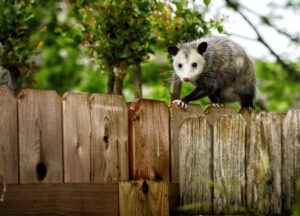
Once they have experienced the gardens on your property, possums may not want to leave. Unfortunately, relocation efforts can be dangerous and often unsuccessful for homeowners to take on themselves. In addition to wildlife control services from professional providers like Eliminate ‘Em, many of the above measures that help repel animals from the garden can also be used to keep possums away. Implementing the following strategies will help you limit critters’ consumption of your produce but leverage any protective benefits these animals or insects provide. For example, opossums consume ticks, rodents, cockroaches, slugs and more.
- Add lighting. Many people already have lights with motion directors around the home, as a protective feature. This same tool also helps repel pests from the garden. Constant outdoor lighting won’t stop some animals, and it may actually increase insect presence. However, the surprise factor of sudden illumination can scare animals away from their intended food sources.
- Harvest regularly. It’s not just overflowing trash cans or food containers for outdoor pets that can attract a variety of bugs and wildlife. For example, failing to keep fruit trees maintained through regular picking can result in an abundance of fallen fruit. This easily accessible food source serves as a dinner invitation for possums, squirrels and other potential pests.
FAQs about Repelling Animals from Your Garden
What fencing should I choose to repel animals?
Fencing helps repel many different animals from your garden, and its construction and material often depend on the kind of wildlife and plants you have. Leverage different types of fencing and be mindful of height, especially if deer visit frequently. Also consider integrating chicken wire or very small mesh into your above ground fencework and underneath beds to deter burrowing.
Do family pets help repel animals from nearby gardens?
Yes! Dogs can help by walking around beds and leaving their scent around the perimeter of the garden. Cats may assist with preying on smaller wildlife. However, both common types of family pets can also dig up or damage plants if their pest control efforts are not regulated.
How can I stop animals from coming back?
For animals who continually return to or damage your garden, try using multiple methods of repelling them or new strategies you haven’t tried before. Additionally, the wildlife control experts near you may be able to recommend additional solutions or more permanent removal suggestions.
Efforts to repel animals from your garden are essential to its survival and success. For guidance about preventative measures or pest and wildlife control solutions for inside or outside of your home or business, Eliminate ‘Em is here to help! With 24/7 same-day availability and rotating special offers, contact our expert team today.


